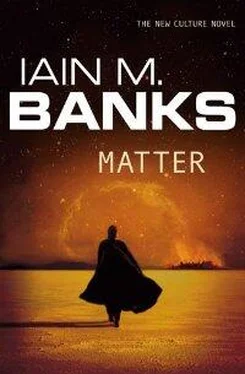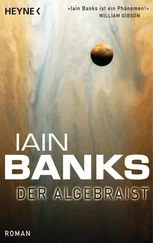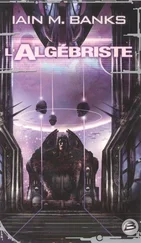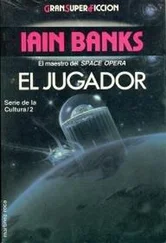The drone’s aura field, invisible until now, glowed rosily for a moment or two. “This,” it said, “should be fun.”
The woman looked at it dubiously. “There aren’t going to be any mistakes this time, are there?”
“Certainly not,” the machine said crisply. “Want to watch?” it asked her. “I mean properly, not through those antique opera glasses.”
Anaplian looked at the machine through narrowed eyes for a little, then said, slowly, “All right.”
The screen blinked into existence just to one side of them this time, so that Anaplian could still see the army in the distance with the naked eye. The screen view was from some distance behind the great column now, and much lower than before. Dust drifted across the view. “That’s from the trailing scout missile,” Turminder Xuss said. Another screen flickered next to the first. “This is from the knife missile itself.” The camera in the knife missile registered the tiny machine scudding past the army in a blur of men, uniforms and weapons, then showed the tall shapes of the wagons, war machines and siege engines before banking sharply after the tail end of the army was passed. The rushing missile stooped, taking up a position a kilometre behind the rear of the army and a metre or so above the road surface. Its speed had dropped from near-supersonic to something close to that of a swiftly flying bird. It was closing rapidly with the rear of the column.
“I’ll synch the scout to the knife, follow it in behind,” the drone said. In moments, the flat circular base of the knife missile appeared as a dot in the centre of the scout missile’s view, then expanded until it looked like the smaller machine was only a metre behind the larger one. “There go the warps!” Xuss said, sounding excited. “See?”
Two arrowhead shapes, one on either side, detached from the knife missile’s body, swung out and disappeared. The mono-filament wires which still attached each of the little warps to the knife missile were invisible. The view changed as the scout missile pulled back and up, showing almost the whole of the army ahead.
“I’ll get the knife to buzz the wires,” the drone said.
“What does that mean?”
“Vibrates them, so that whatever the monofils go through, it’ll be like getting sliced by an implausibly sharp battleaxe rather than the world’s keenest razor,” the drone said helpfully.
The screen displaying what the scout missile could see showed a tree a hundred metres behind the last, trundling wagon. The tree jerked and the top three-quarters slid at a steep angle down the sloped stump that was the bottom quarter before toppling to the dust. “That took a flick,” the drone said, glowing briefly rosy again and sounding amused. The wagons and siege engines filled the view coming from the knife missile. “The first bit’s actually the trickiest…”
The fabric roofs of the covered wagons rose into the air like released birds; tensed hoops of wood — cut — sprang apart. The giant, solid wheels of the catapults, trebuchets and siege engines shed their top sections on the next revolution and the great wooden structures thudded to a halt, the top halves of some of them, also cut through, jumping forward with the shock. Arm-thick lengths of rope, wound rock-tight a moment earlier, burst like released springs then flopped like string. The scout missile swung between the felled and wrecked machines as the men in and around the wagons and siege engines started to react. The knife missile powered onwards, towards the foot soldiers immediately ahead. It plunged into the mass of spears, pikes, pennant poles, banners and flags, scything through them in a welter of sliced wood, falling blades and flapping fabric.
Anaplian caught glimpses of a couple of men slashed or skewered by falling pikeheads.
“Bound to be a few casualties,” the drone muttered.
“Bound to be,” the woman said.
The knife missile was catching glimpses of confused faces as men heard the shouts of those behind them and turned to look. The missile was a half-second away from the rear of the mass of mounted men and roughly level with their necks when the drone sent.
— Are you sure we can’t…?
— Positive, Anaplian replied, inserting a sigh into what was an entirely non-verbal exchange. — Just stick to the plan.
The tiny machine nudged up a half-metre or so and tore above the mounted men, catching their plumed helmets and chopping the gaudy decorations off like a harvest of motley stalks. It leapt over the head of the column, leaving consternation and fluttering plumage in its wake. Then it zoomed, heading skywards. The following scout missile registered the monofil warps clicking back into place in the knife missile’s body before it swivelled, rose and slowed, to look back at the whole army again.
It was, Anaplian thought, a scene of entirely satisfactory chaos, outrage and confusion. She smiled. This was an event of such rarity that Turminder Xuss recorded the moment.
The screens hanging in the air disappeared. The knife missile reappeared and swung into the offered hatchway in the side of the drone.
Anaplian looked out over the plain to the road and the halted army. “Many casualties?” she asked, smile disappearing.
“Sixteen or so,” the drone told her. “About half will likely prove fatal, in time.”
She nodded, still watching the distant column of men and machines. “Oh well.”
“Indeed,” Turminder Xuss agreed. The scout missile floated up to the drone and also entered via a side panel. “Still,” the drone said, sounding weary, “we should have done more.”
“Should we.”
“Yes. You ought to have let me do a proper decapitation.”
“No,” Anaplian said.
“Just the nobles,” the drone said. “The guys right at the front. The ones who came up with their spiffing war plans in the first place.”
“No,” the woman said again, rising from her seat and, turning, folding it. She held it in one hand. With the other she lifted the old pair of binoculars from the table. “Module coming?”
“Overhead,” the drone told her. It moved round her and picked up the camp table, placing the glass and water bottle inside the backpack beneath. “Just the two nasty dukes? And the King?”
Anaplian held on to her hat as she looked straight up, squinting briefly in the sunlight until her eyes adjusted. “No.”
“This is not, I trust, some kind of transferred familial sentimentality,” the drone said with half-pretended distaste.
“No,” the woman said, watching the shape of the module ripple in the air a few metres away.
Turminder Xuss moved towards the module as its rear door hinged open. “And are you going to stop saying ‘no’ to me all the time?”
Anaplian looked at it, expressionless.
“Never mind,” the drone said, sighing. It bob-nodded towards the open module door. “After you.”
The place had to be some sort of old factory or workshop or something. There were big toothed metal wheels half buried in the wooden floors or hanging by giant spindles from the network of iron beams overhead. Canvas belts were strung all over the dark spaces connecting smaller, smooth wheels and a host of long, complicated machines he thought might be something to do with weaving or knitting. It was all very dusty and grimy-looking. And yet this had been that modern thing; a factory! How quickly things decayed and became useless.
Normally he would never have considered going anywhere near some place so filthy. It might not even be safe, he thought, even with all the machinery stilled; one gable wall was partially collapsed, bricks tumbled, planks splintered, rafters hanging disjointed from above. He didn’t know if this was old damage from deterioration and lack of repair, or something that had happened today, during the battle. In the end, though, he hadn’t cared what the place was or had been; it was somewhere to escape to, a place to hide.
Читать дальше












